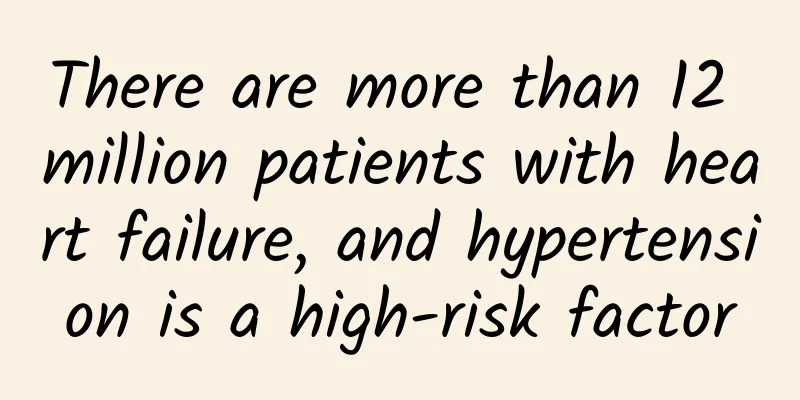There are more than 12 million patients with heart failure, and hypertension is a high-risk factor

|
Today is the ninth National Heart Failure Day. As one of the most serious cardiovascular diseases in my country, the number of patients with heart failure (abbreviated as: HF) has reached 12.1 million, and the incidence rate is still increasing year by year. Experts warn that although the level of standardized treatment of heart failure in my country has been significantly improved, the overall prognosis of heart failure is still poor, and the re-hospitalization rate and mortality rate remain high. Patients with hypertension, coronary heart disease, diabetes, and chronic kidney disease are at high risk of heart failure. We must pay attention to and attach importance to the early intervention and standardized management of heart failure throughout the course of the disease. The burden of heart failure is heavy, with more than 60% of heart failure patients aged 60 or above The heart is like a "water pump", which continuously transports blood to the whole body through the arteries, while receiving blood transported back to the heart from the surrounding tissues and organs by the veins. Heart failure is the result of a decline in the heart's pumping function caused by various cardiovascular diseases and various heart abnormalities. Currently, the five-year mortality rate of heart failure is between 50% and 60%, which is comparable to the five-year mortality rate of common malignant tumors. What is particularly worrying is that more than 60% of heart failure patients are over 60 years old. Elderly heart failure patients are often repeatedly hospitalized due to the coexistence of multiple diseases, multiple medications, and physical function decline. They not only face the pain brought by the disease, but also bear a huge economic burden. Typical clinical symptoms of heart failure include dyspnea at rest or during activity, chest tightness, shortness of breath, rapid heartbeat, ankle edema, fatigue, and increased venous pressure. Among them, shortness of breath, edema, and obvious fatigue or tiredness are more common symptoms. When these typical symptoms appear, you need to be alert and seek medical attention in time. Professor Zhang Jian, chief physician of the Heart Failure Center of the Fuwai Hospital of the Chinese Academy of Medical Sciences, said: "Pulmonary congestion caused by heart failure may increase the risk of respiratory tract infection in patients. Patients with heart failure who are bedridden for a long time may also face the risk of lower limb venous thrombosis. At the same time, insufficient renal vascular perfusion can lead to abnormal renal function. In addition, heart failure may cause the liver to be in a state of congestion and hypoxia for a long time, causing cardiogenic cirrhosis. It can be said that heart failure will affect the patient's organs throughout the body and severely limit the patient's daily activities. In addition, heart failure may also have a negative impact on the patient's work and social life, and even cause negative emotions such as depression and anxiety, physical weakness, and make the patient suffer both physically and psychologically." The work report of the China Heart Failure Center (2021) shows that the main causes of heart failure are hypertension and coronary heart disease. There are now more than 245 million patients with hypertension in my country. In addition, the increase in high-risk groups such as coronary heart disease, senile valvular disease and diabetes has also made the "reserve army" of heart failure grow, resulting in the incidence and mortality of heart failure increasing year by year. Patients with heart failure and chronic diseases need to pay more attention to comprehensive management Heart failure is difficult to cure, but it can be prevented. Heart failure patients often suffer from multiple comorbidities such as hypertension, diabetes, chronic kidney disease, etc., and heart failure and comorbidities affect each other, which can easily form a vicious cycle. Data show that nearly 2/3 of heart failure patients have a history of hypertension; about 40%-50% of heart failure patients have chronic kidney disease; about 30% of heart failure patients have type 2 diabetes. Once patients with type 2 diabetes develop heart failure symptoms, the disease progresses rapidly and the mortality rate is high. Such heart failure patients should conduct standardized management of high-risk factors such as hypertension, diabetes, and chronic kidney disease, and regularly monitor blood pressure, blood sugar and other indicators to detect abnormalities in a timely manner and take intervention measures. At the same time, an increase in heart rate is also closely related to the poor prognosis of heart failure and the progression of the disease. Studies have shown that an increase of 5 heartbeats per minute can increase the patient's cardiovascular mortality rate and heart failure re-hospitalization rate by 16%. Therefore, heart failure patients also need to pay attention to their heart rate. RAAS inhibitors commonly used by heart failure patients can cause an increase in blood potassium, which may lead to cardiac arrest in severe cases. Therefore, heart failure patients also need to pay attention to blood potassium management. Professor Zhang Jian also reminded that the use of heart failure medication should follow the guidelines, and patients should take medication on time and in sufficient amounts, and should not change or stop medication at will. In addition, heart failure patients often have multiple chronic diseases such as hypertension and diabetes, which will cause the risk of cardiovascular events in patients to increase exponentially. Therefore, while treating heart failure, comprehensive management of comorbidities is also required to delay the progression of the disease. Heart failure does not mean the end of life. Adhering to long-term standardized treatment can also lead to a high-quality life. |
<<: China's new breakthrough in gene editing brings hope to millions of blind people
Recommend
Why does leucorrhea smell sour?
The leucorrhea has a sour smell, so women should ...
What causes leg cramps in women
Calf cramps are a common condition encountered by...
How many millimeters can the endometrium grow in a day?
The endometrium is a critical part of the female ...
How long does it take to get your period after taking birth control pills?
We all know that taking birth control pills regul...
Why does vaginal bleeding occur after taking Chinese medicine?
Vaginal bleeding after taking traditional Chinese...
Why do women have genital odor?
The odor of female genitals may be a problem that...
What causes women to have strong odor?
In the hot summer, we often smell a lot of body o...
What are the dangers of amenorrhea?
Amenorrhea is a gynecological disease that harms ...
How to solve the problem of thick, yellow and odorless leucorrhea?
Leucorrhea is a physiological phenomenon unique t...
What is the name of the polar bear's ancestor? Are polar bears social animals?
Polar bears appear in countless cartoons. They ar...
Citibank: Amazon Kindle Reader and Kindle Fire Tablet User Behavior Survey Data
Citibank analyst Mark Mahaney recently released a...
What should I do if I gain weight after giving birth?
Obesity is almost the most annoying phenomenon in...
What medicine should I use for postpartum relaxation?
Women all know that there are many reasons for va...
What is the reason for a small amount of menstrual flow and a normal cycle?
Menstruation is very important for women. It is a...
What is the cause of placental abruption?
Placental abruption is a very serious complicatio...









